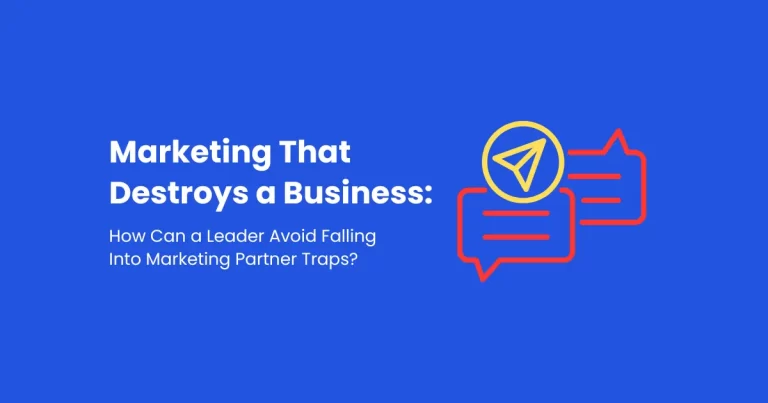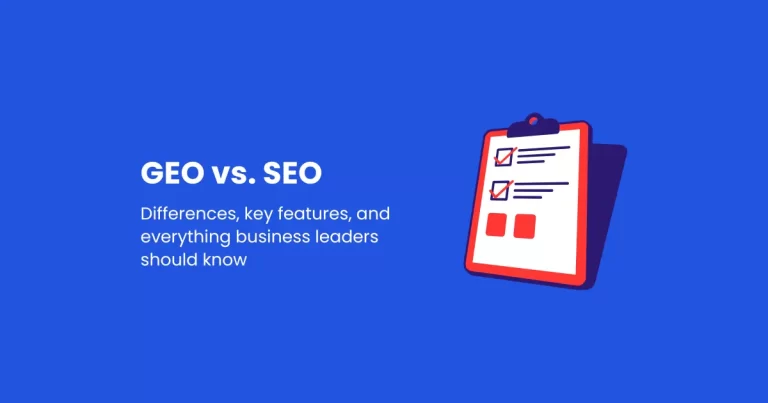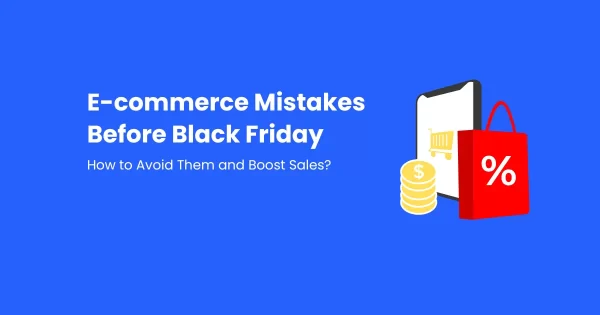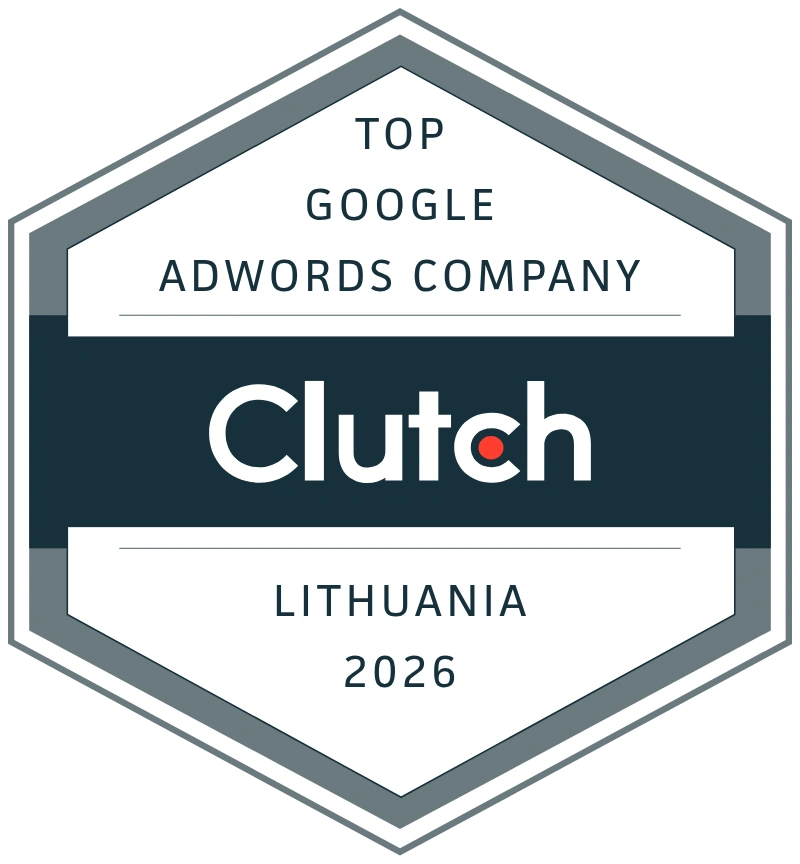How to Choose a Digital Marketing Agency: A Complete Guide
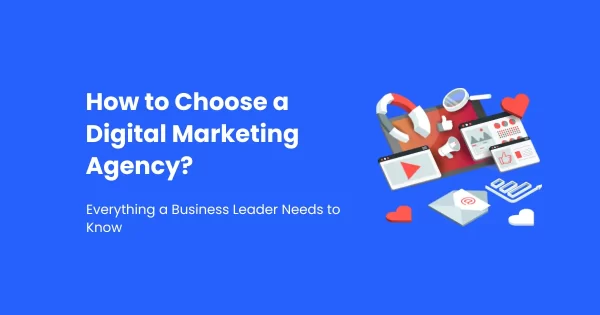
In today’s world, the importance of digital marketing for business is undeniable — both for e-commerce and the B2B services sector. To achieve real results, you must clearly define your goals, prepare a strategy, and choose reliable partners to execute it. The right marketing agency — whether a specialised digital marketing agency or an experienced advertising agency — can determine not only the effectiveness of your campaigns but also long-term business growth and profitability.
In this article, we’ll cover the most important criteria to consider when choosing a digital marketing agency and share practical tips to help you avoid common mistakes and simplify the decision-making process. You’ll learn:
- How to choose the right digital marketing agency to manage your digital marketing
- How to avoid mistakes when selecting a digital marketing agency
- Which criteria matter most when evaluating a digital marketing agency
- Which questions you should ask before starting a partnership
- FAQ
Digital Marketing Agency Selection: Complete Guide for Businesses
Practical tips for deciding on which digital marketing agency to choose
Working with a digital marketing agency is not just purchasing a service. It is a long-term decision that will influence how your business develops and what results you achieve. Today, businesses can choose from several models — working with a team of freelancers, building an in-house marketing structure, collaborating with a marketing or advertising agency, or combining these options. However, finding the right partner requires time and analysis, because this choice will affect not only the success of your campaigns but also team dynamics.
A logical, well-thought-out selection process allows you to evaluate not only the partner’s price or reputation, but also their ability to plan, measure, analyse and clearly interpret data. A reliable marketing partner focuses not only on creativity or campaign management, but also on accurate data tracking. They ensure that Google Analytics 4 and Tag Manager are set up correctly, that the consent management system complies with GDPR requirements, and that data is collected and interpreted properly. Only then can you make decisions that genuinely drive business growth.
Base your decision on analysis, not impulse
One of the most common mistakes is identifying the need for digital marketing services impulsively, without assessing the business situation and objectives. Decisions like “we need SEO,” “we need ads,” or “we need to appear in AI-generated answers” are often made emotionally rather than based on data and strategic priorities. However, no single tactic on its own guarantees sales growth or long-term return — even when executed by an experienced marketing agency.
In recent years, various methods and automation solutions promising quick results have become extremely popular. Yet in many cases, these offers rely on the same basic sales principles, simply packaged in a new form. The expansion of artificial intelligence has accelerated this trend even further — the market is full of “experts” proposing identical solutions to different businesses, without considering their specific context. As a result, it’s becoming increasingly difficult for companies to understand which marketing agency can actually create value.
In theory, any AI tool can draft a marketing strategy today, but real marketing success depends not on what is written in the strategy, but on how it is implemented in a real business environment — considering the market, customer behaviour and the company’s goals. Here, a professionally operating advertising agency has a significant advantage: the ability to adapt solutions to real conditions rather than follow generic recommendations.
This is why, before choosing a provider, it is essential to clearly define which problem you want to solve and what results you consider a success. Rushed service purchases driven by discounts, recommendations, or trends often end in disappointment. In such cases, businesses often draw the wrong conclusion: “marketing doesn’t work,” when in reality it is the application of marketing — or the initial decisions — that failed, regardless of whether the work was done internally or by a marketing agency.
The first wrong steps often shape a negative perception that blocks future success. In most cases, the problem arises not from the wrong tool, but from unclear goals, an undefined strategy or actions taken at the wrong time. A properly assessed situation and clearly formulated objectives are essential for effective marketing and sustainable results — because only then can a marketing agency truly demonstrate its competence.
Identify Your Business Challenges for the Present and Near Future
Set aside time to define your real business challenges, priorities, and expectations for your digital marketing partners. This is not as simple as it may seem — but it determines whether you will focus on solving the right problems.
Greater visibility is not the same as sales growth. You may increase awareness, yet your sales may not move at all. If the real goal was to grow sales, not just visibility, the results will be disappointing.
This is why it’s crucial to understand what the actual challenge is. The sale itself is not the challenge. The challenge is what stands in the way of achieving that sale. For example:
- If your product is complex or difficult to understand, the real challenge is to clearly communicate its value and benefits.
- If you lack visibility, the challenge is to increase awareness.
- If the issue lies in consumer perception, the challenge is to reshape how they understand your offering.
Each of these challenges requires different tools, actions and competencies. Addressing one will inevitably bring you face-to-face with others.
Clarify and Prioritise Your Digital Marketing Needs
To choose the right agency, freelancer or internal hire, you must first clearly understand which services and competencies your business requires for solving its specific challenges.
Digital marketing areas such as SEO, Google Ads, Meta Ads, email marketing, social media communication, and content creation each provide different value depending on your business model, product and goals.
If your challenge is low brand awareness, potential solutions include SEO, Google Ads, social media or influencer advertising, email marketing, and more. However, it’s essential to understand exactly what you want to achieve and how you will measure it.
SEO and search advertising help you be visible when a user is already looking for your product, but they do not build awareness among a broader audience. In addition, SEO requires significant time and thorough data analysis.
This is why, in many cases, it is smarter to begin with Google Ads campaigns to quickly identify which keywords actually generate sales. Only then can you develop a deeper, more cost-effective long-term SEO strategy.
How to Choose A Digital Marketing Agency Wisely and Avoid Mistakes
Do you have enough knowledge to decide which marketing tools will be most effective for your business? If not — don’t make this decision alone. Most service providers will recommend the services they offer, not necessarily what is best for you.
Involve an independent strategist or a specialist with agency experience who can help you build a clear strategy and set priorities before choosing who will implement specific services.
A short or sales-focused consultation (30–60 minutes) won’t help — it’s designed to present the service, not analyse your situation. A well-prepared strategic consultation requires a deeper understanding of your business model, products, customers, sales process and existing channels.
Tip: Make sure the chosen specialist or agency truly understands your business specifics, challenges and how their services will contribute to achieving your goals.
When to Hire a Freelancer
Hiring a freelancer is a smart choice when you have enough competence to manage the digital marketing project yourself and clearly know what to ask for and what to expect. It’s a good solution if your company has a digital marketing project manager or when tasks are clear, specific, simple and one-off. In such cases, it can also help you save money.
Freelancers are usually narrow-field experts who can deliver specific tasks with high quality. However, they typically do not dive deeply into strategy and rarely take initiative outside their assigned tasks. Their strength is execution, not planning.
If you have a strong project manager, don’t make them do everything themselves — give them the opportunity to hire and coordinate one or several freelancers instead. This makes the process far more efficient.
Freelancers are ideal for short-term, one-off or clearly defined tasks, but you should not expect deep involvement in your business specifics or product nuances.
When to Hire In-House Employees
If your business’s financial situation allows you to hire internal marketing staff, this can be an excellent solution. However, before doing so, it’s important to consider a few key factors.
1. Don’t Put Every Marketing Task on One Person
It often happens that one specialist is expected to handle everything — from SEO and Google Ads to social media communication, content creation, design and email marketing.
This is a major mistake.
Each area has its own specifics and requires continuous hands-on practice. Some specialists need two full years of daily work to become truly competent in just one field.
2. Evaluate the Specialist’s Experience
Extensive experience in a single industry has advantages, but also clear limitations — such a specialist may see things too narrowly. Their knowledge is often based on only a few experiences, which may not reflect broader market dynamics.
You can compensate for this by periodically involving agencies or external experts with a wider perspective, who can objectively evaluate your situation.
3. Budget Management Skills
A specialist who has worked only with large budgets may struggle with smaller ones — and vice versa. Different budget levels require different strategies and skill sets.
Agency specialists usually have practical experience managing budgets of various sizes, which allows them to offer more flexible and suitable solutions.
4. The Risk of “Getting Stuck Inside”
Internal employees often become overly focused on the company’s internal processes and lose sight of the external market. This can lead to poor decisions — or even serious business setbacks.
Agency specialists, on the other hand, tend to react faster to market changes, experiment with new approaches, and have access to the latest best practices.
Digital Marketing Agency: When Is It Worth Working With One?
Agentūra gali būti tarpinis variantas tarp freelancerių ir vidinės komandos arba papildyti jau veikiančią komandos struktūrą. Ji dažnai pasirenkama dėl turimų kompetencijų, sukauptos praktikos ar prieigos prie pažangių technologijų.
Agentūra gali pasiūlyti tiek projektų vadovą, tiek visą komandą įvairių sričių specialistų – nuo strategų iki reklamos, turinio ar dizaino ekspertų. Kadangi daugumai verslų nereikia nuolatinės visos rinkodaros komandos, agentūra tampa lankstus ir ekonomiškas sprendimas įvairiems uždaviniams spręsti.
Kas slypi už žodžio reklamos agentūra?
We often hear the term advertising agency and assume it covers everything related to advertising — but that’s not entirely true. There are different types of advertising agencies, and every client should understand these distinctions before hiring one. Below is a closer look at the main types:
Kūrybinė agentūra
They create ideas, messages, visuals, logos and develop the brand identity. These agencies are especially valuable for emotion-driven products and mass-market brands, where creativity, emotional connection and distinctiveness are essential.
Performance (Results-Driven) Agency
They focus on measurable results — paid advertising, conversion optimisation, PPC, SEO and similar areas. These are the “numbers people,” for whom the most important metrics are sales, efficiency and return on investment. While there is less creativity in these agencies, they are an excellent choice for businesses whose customers search for products through search engines (Google, Bing).
Full-Service Digital Marketing Agency
A full digital agency offers the complete range of services — from strategy, creative, social media and PPC to SEO, design and website development. The biggest advantage of these agencies is that everything is in one place, making processes simpler and more convenient. However, combining two worlds — creativity and analytics — can be challenging, and sometimes one side suffers.
Media Agency
A media agency plans and buys advertising placements and media channels. Although they traditionally work with classic advertising formats, some apply their planning methodologies to digital marketing as well. These agencies most often collaborate with large corporations, where processes are strictly structured and less flexible.
Marketing Agency: What to Pay Attention to When Choosing One
If you have done your “homework” well, you should already know which type or specialisation of agency can best support your business.
However, choosing a reliable partner — one who not only understands your business goals but can also offer modern solutions and ensure a strong return on investment — is not easy. That’s why we’ve put together a list of recommendations to help you evaluate potential partners more objectively and make a well-grounded decision.
Agency Experience and Specialisation
Pay attention to whether the agency has experience working in your industry. Market specifics can vary greatly: what works in fashion or beauty may not work in B2B services or real estate.
An experienced agency will be able to share not only general insights, but also concrete cases, clear figures and results that demonstrate their competence. Evaluate not only the agency’s overall experience but also whether its strengths match your business needs and goals.
If the agency avoids providing examples or speaks very abstractly, this may be a sign that experience in that field is lacking.
Digital Marketing Agency Reviews: What You Should Check
Google reviews or ratings on other platforms can be useful, but they don’t always reflect reality. If an agency has significantly more reviews than its competitors, it may indicate that some of them were collected artificially.
Pay attention to the content of the reviews — generic comments such as “Great agency, friendly team, highly recommend” usually say nothing. A valuable review should include facts, achievements or results that can be verified.
Be critical and check who wrote the review. Look up the person on LinkedIn — do they actually work for a company that could have used the agency’s services? If the name or company cannot be found, that’s a clear warning sign.
If you find contradictory or suspicious comments, ask the agency for clarification. A professional partner will respond openly and with clear explanations. Anonymous reviews are best ignored.
Platforms like Clutch.co usually have more reliable feedback, but even there you should analyse the content — a “verified” entry is not an absolute guarantee.
Finally, the best way to check an agency is to ask for contacts of former or current clients and speak directly with them. These conversations often reveal far more than public reviews.
Check the Advertising Agency’s Credibility in Other Ways
Often a digital marketing agency or individual specialist may present themselves as a market expert with a “unique formula” for business growth. Big promises and bold claims are common — but frequently, this is simply a promotional tactic to attract new clients.
To avoid falling into these traps, you should know what to look at:
- Major tech companies like Google and Meta have official partnership programs.
- The larger the ad spend an agency manages on these platforms, the higher its partner status.
If an agency claims to manage millions in ad spend or generate millions in revenue but:
- Is not listed in Google’s or Meta’s partner directories, or
- Holds a very low partnership status
… this raises reasonable doubts.
The highest Google partnership level is Google Premier Partner — a clear sign that the company recognises the agency as a professional and effective performer in its ecosystem.
Also check:
- The number of employees and how this number has changed over time — this helps you understand which competencies the agency truly has and how it is developing
- How long the agency has been operating in the market — this can say a lot about its stability and experience
Digital Marketing Agency and Data-Driven Decision-Making
Successful digital marketing today is impossible without continuous data analysis. Professional agencies base their actions on concrete numbers and performance indicators — from conversions and funnel stages to audience behaviour and engagement with content.
This approach not only helps assess campaign effectiveness but also supports decisions that improve budget efficiency and increase return on investment (ROI) over time.
Pay attention to whether the agency has clearly defined processes for measuring success:
- Do they establish specific KPIs, such as CPA, ROAS, CTR, or conversion value?
- Do they analyse not only overall traffic but also the full customer journey, behaviour and lifetime value?
Only thorough data analysis makes it possible to understand what works and what doesn’t — and to continually improve results.
It’s Not Enough to Collect Data — It Must Be Understood
Pretty reports or colourful charts do not guarantee success. A strong agency must be able to clearly explain:
- What specific metrics mean
- How they affect your business
- What actions you should take next based on the data
Data should guide strategy — not just serve as decoration in a report.
A Data Analyst — an Irreplaceable Team Member
When choosing an agency, find out whether it employs a data analyst or a data strategy specialist — and what their level of expertise is. This is one of the key success factors in modern marketing. A data specialist not only collects and analyses information but also transforms it into strategic insights that enable informed decision-making. Without such an expert, it is impossible to create accurate analysis, an effective marketing strategy, or to properly integrate artificial intelligence solutions, whose efficiency directly depends on data quality and interpretation. Today, when business success depends on the ability to quickly and precisely respond to changes in consumer behaviour, a data expert is not a luxury but a necessity.
Digital Marketing Agency and Use of Artificial Intelligence Tools
Today, artificial intelligence (AI) has become one of the most important factors shaping marketing effectiveness and overall business competitiveness. A marketing agency capable of effectively integrating AI solutions into everyday processes ensures not only stronger campaign performance, but also a sustainable competitive advantage.
AI technologies allow repetitive tasks to be automated, giving specialists more time for strategic decisions, creativity and in-depth analysis. When applied correctly, AI can significantly enhance digital marketing processes:
- Ad algorithm optimisation. Google Ads and Meta Ads operate based on machine learning, so the quality and structure of your data directly influence performance. Agencies that know how to “feed” these algorithms with the right signals can achieve better ROI and higher sales.
- Real-time content personalisation. AI can analyse user behaviour, needs and preferences and deliver personalised messages that significantly increase the likelihood of conversion.
When choosing an agency, it’s worth investigating how exactly that advertising agency uses AI technologies — and whether they have their own tools or methodologies. The difference between an agency that only talks about AI and one that actually implements it can determine whether your campaigns simply run — or become a powerful growth engine for your business.
Transparency and Communication: What Every Business Needs from The Digital Marketing Agency
Effective collaboration with a digital marketing agency starts with transparency and consistent communication. Only when information flows openly can you ensure that your investment is used responsibly and that results are clearly visible, justified and easy to understand.
Transparency means you should always know:
- Where and how your money is spent
- What the current status of your campaigns is
- What actions are planned to improve results
An agency that provides only surface-level data or limited information cannot be considered a reliable long-term partner.
One of the most important signs of transparency is full access to your advertising accounts. If your team cannot see real campaign data, you risk not knowing the true situation and being unable to make informed decisions.
Reports are equally important — they must be clear, understandable and aligned with your business goals, not only with platform-specific metrics. A good report answers:
- What happened?
- Why did it happen?
- What will we do next?
It’s also important to understand that a high ROAS is not a universal success metric — for example, if your goal is brand awareness, ROAS is not a suitable indicator at all.
The frequency of communication should match your business needs, but regular weekly or at least monthly review sessions are essential. During these meetings, you discuss results, challenges, new opportunities and upcoming actions. A reliable agency does not limit itself to sending reports by email — it actively initiates meetings, asks questions, provides insights and offers ideas to create real added value for your business.
Questions to Ask Before Starting Work With an Digital Marketing Advertising Agency
- Does the agency provide full access to your advertising accounts?
- Are the reports clear and easy to understand, not just full of technical jargon?
- How often are review meetings planned, and what is their structure?
- Is the agency’s team easily reachable when questions or issues arise?
Transparency and consistent communication are the foundations of successful collaboration and trust. Without them, even a technically well-executed campaign loses part of its effectiveness, because there is no shared direction, common goals or mutual understanding.
Shared Values: When You and Your Digital Marketing Agency Speak the Same Language
The marketing agency you work with should be not just a service provider, but a true partner to your team. That’s why value alignment becomes one of the most important criteria for successful collaboration. Values shape not only the quality of work, but also the dynamics of the partnership — from how problems are solved to how strategic decisions are made.
One key aspect is the agency’s attitude toward innovation. The digital marketing landscape changes extremely fast, so a marketing agency that adapts quickly, experiments and integrates new tools into its processes gains a clear competitive advantage. When choosing a partner, evaluate whether the agency not only follows trends but actively implements innovations in its work.
Another fundamental aspect is data security and responsibility. Regulations such as GDPR and TCF 2.2 today are not only legal requirements but also an important part of business reputation. A trustworthy agency ensures that your data is handled transparently and responsibly, following all legal and ethical standards. This protects your business and strengthens customer trust in your brand.
Finally, assess the agency’s attitude toward partnership. Is it focused only on short-term results, or does it aim to build a long-term, trust-based relationship grounded in shared growth and strategic thinking? Agencies that value transparency, integrity and sustainable collaboration become not just advertising suppliers, but strategic partners that help your business grow consistently.
The Digital Marketing Agency’s Leadership and Management Structure
An organisation’s values are shaped from the top — by the leader’s mindset, decisions and leadership style. The CEO determines how these values are passed on to the team and how they show up in daily processes — both internally and in communication with clients. That’s why, when choosing an agency, it’s worth understanding which values it declares and whether they are truly practiced.
In the digital marketing world, agencies differ greatly. Some operate solely with a quick-profit mindset — they often offer lower prices but invest minimally in their clients’ long-term growth. Others focus on long-term collaboration, consistent client development and sustainable results. These agencies usually become true strategic partners, not just advertising vendors.
If you feel that all agencies look the same, it’s a sign you haven’t yet explored their values, work methods and leadership approach deeply enough. The differences exist — and they often determine whether the collaboration becomes a short-lived transaction or a long-term success story.
A Reliable Digital Marketing Agency — A Responsible Decision and a Valuable Investment
Choosing the right digital marketing agency is one of the most important investments your business can make. It’s not just about buying a service — it is a strategic decision that influences your brand visibility, sales growth and long-term competitive position.
Therefore, a digital marketing agency should be chosen not by the lowest price or most attractive offer, but by its ability to become a true partner on your path to success.
Look for a partner who:
- Has clear experience and real, proven results
- Bases decisions on data and AI tools rather than guesswork
- Ensures transparency and consistent communication
- Thinks strategically and adapts to your business specifics
- Backs up their words with actions
In the end, remember one simple truth: working with an agency is a journey in the same boat. Success depends on both sides — but you set the direction. Choose a partner you trust — one who will help you achieve not only quick wins but also sustainable long-term growth.
We also recommend reviewing the list of Google Premier Partner agencies here.
And if you’re interested in the future of B2B advertising, we recommend reading: 2025 and B2B Digital Advertising: Best Practices
FAQ
What Matters Most When Choosing a Digital Marketing Agency?
The most important factor is the people you will be working with. An agency’s success is not determined by its name or size, but by the competence, mindset and leadership of its specialists. Experienced experts who truly understand data-driven marketing, customer behaviour and the digital advertising ecosystem can create real value for your business.
Equally important is the mindset of the agency’s leadership. The leader shapes the agency’s culture, values, work principles and approach to client success. A CEO who prioritises strategic thinking, innovation, transparency and partnership usually builds a team capable of delivering the highest quality results.
When choosing an agency, evaluate not only individual skills, but also how the team thinks:
– Do they understand the bigger picture of your business?
– Do they grasp your goals?
– Can they propose a long-term strategic direction?
Only this type of partnership ensures sustainable growth and genuine return on your marketing investment.
What Size Digital Marketing Agency Should You Choose?
The size of an agency should not be the main factor when selecting a partner. Many assume that a larger agency automatically means higher-quality services — but that’s not always true. Larger organisations often have more complex management structures and bureaucratic processes, which can slow down decision-making and reduce flexibility. Additionally, some of their competencies or services may be excessive and not necessarily relevant to your business.
Smaller agencies, on the other hand, often offer greater flexibility, faster response times and a more personalised approach. However, they may face challenges when handling larger projects or may lack certain specialists and experience needed for more complex tasks.
That’s why your choice should be based not on the agency’s size, but on your business needs: what competencies, skills and experts you actually require. The right agency is the one that has exactly what will help your business grow — regardless of how many people work there.
How to Know If an Agency Is the Right Fit for Your Business
A suitable agency has three key qualities:
- It understands your business model and audience.
- It can clearly explain what it will do and how results will be measured.
- It communicates transparently and consistently.
If, during the very first conversation, the agency asks specific questions about your goals, customers, seasonality and current performance metrics — that’s a very good sign.
What Results Can I Expect and How Long Will It Take?
Advertising results depend on your niche, competition and how well your website is prepared.
In most cases, you can start seeing real changes within 2–3 months, while stable growth typically appears within 6–12 months.
A reliable agency will never promise quick miracles — instead, it will focus on the process and clearly defined KPIs.
Can I Work With an Agency If My Budget Is Small?
Yes — but it’s important to realistically assess what can be achieved.
Small budgets usually mean a narrower audience, fewer tests and a simpler strategy. A reliable agency will openly tell you what minimum investment is needed for advertising to make sense and not waste your money.


